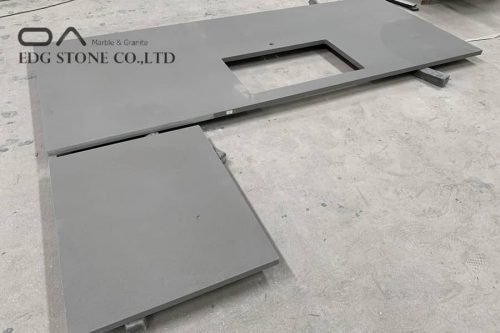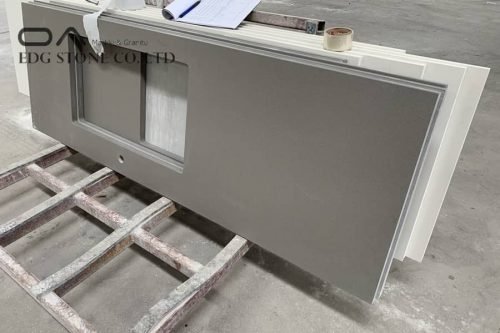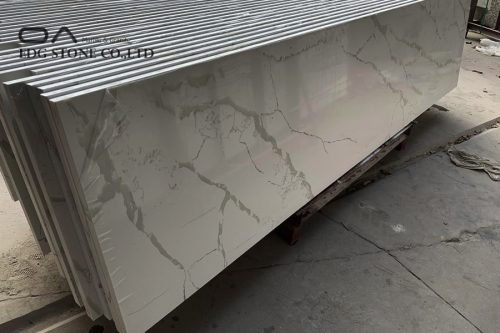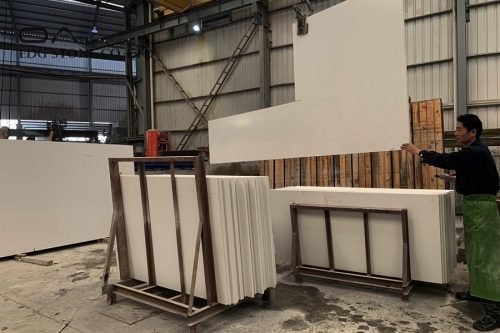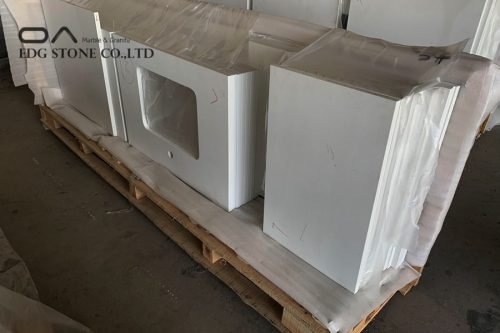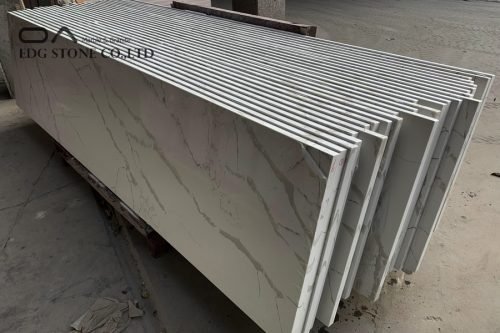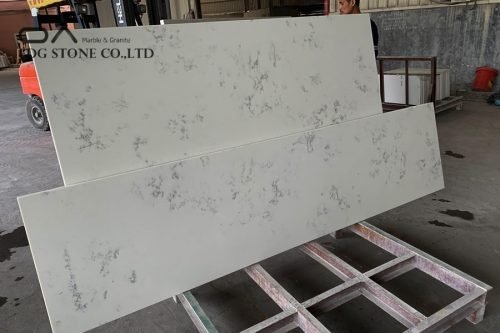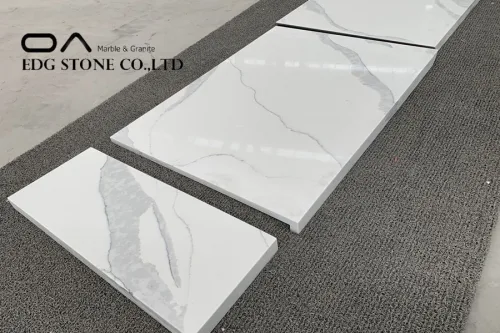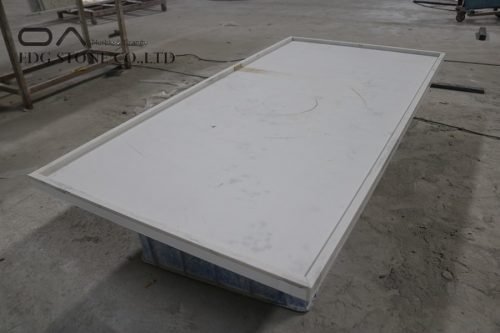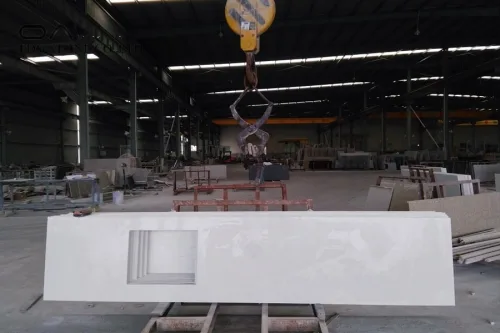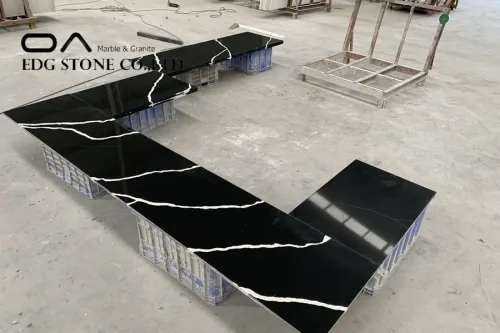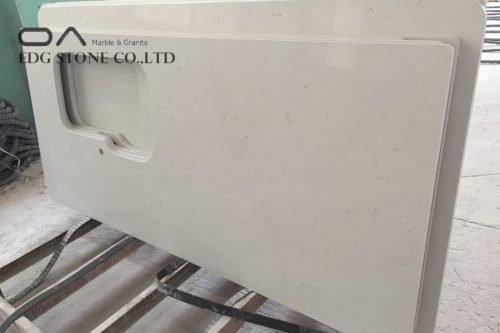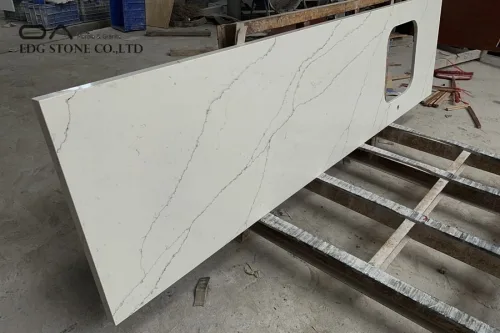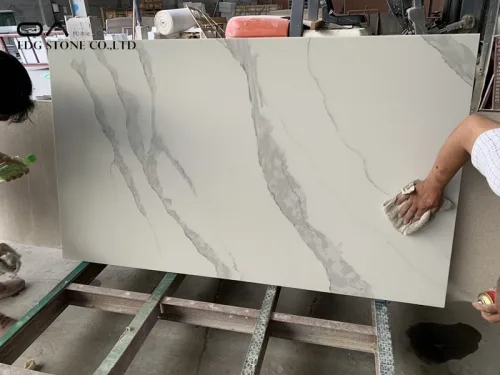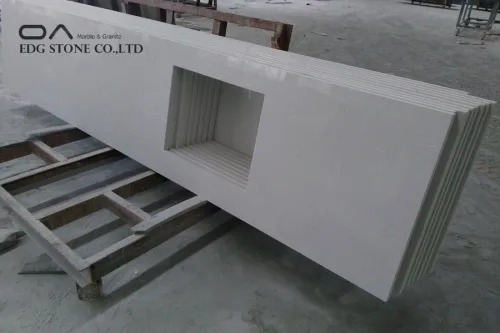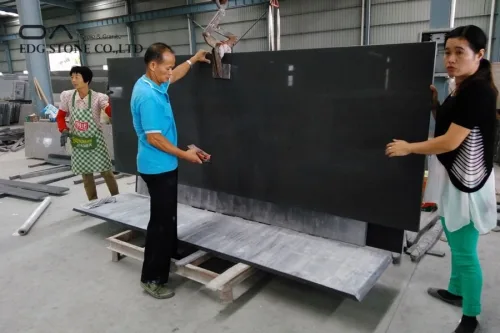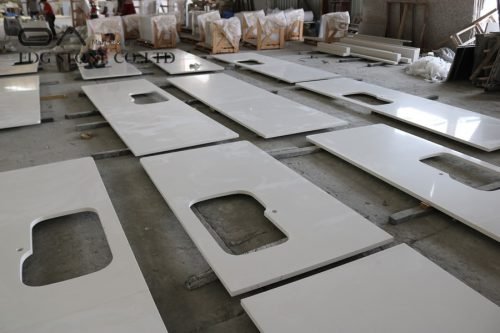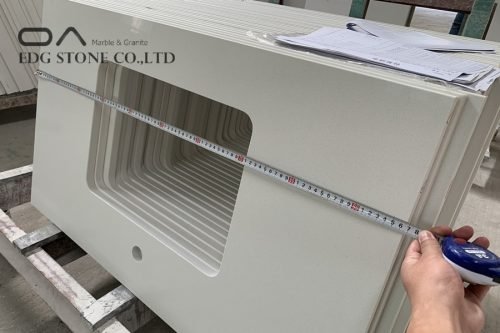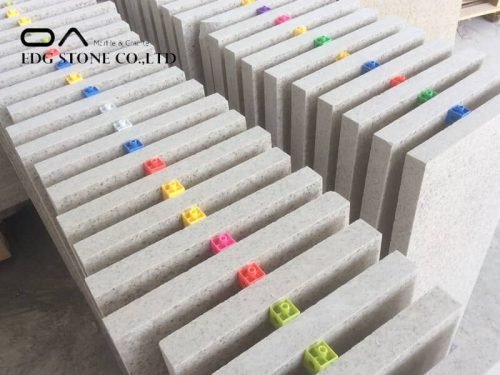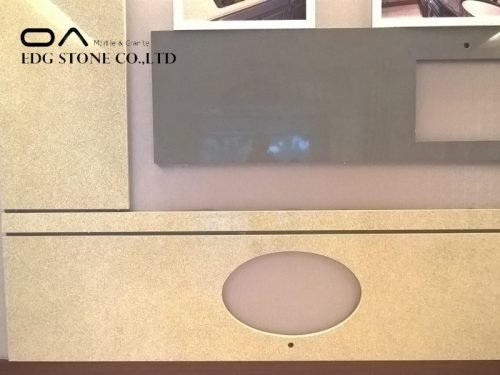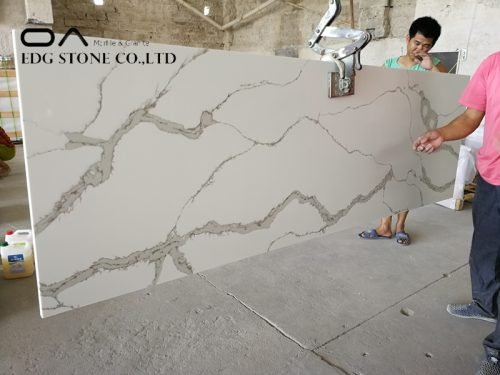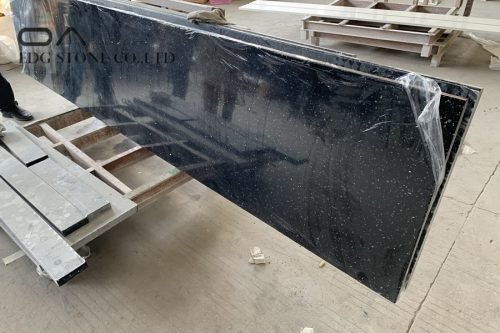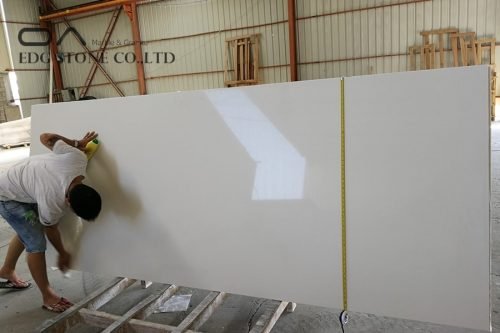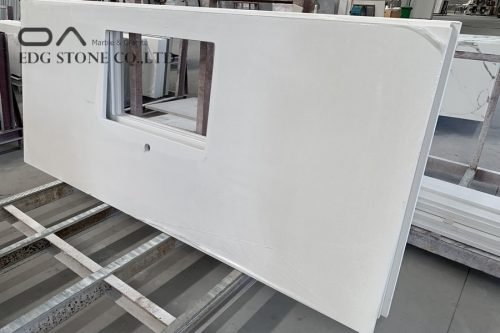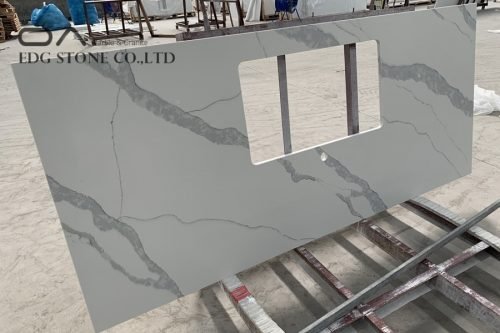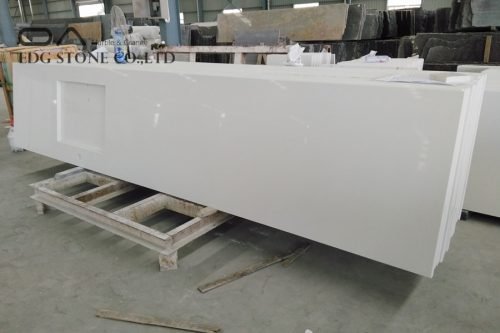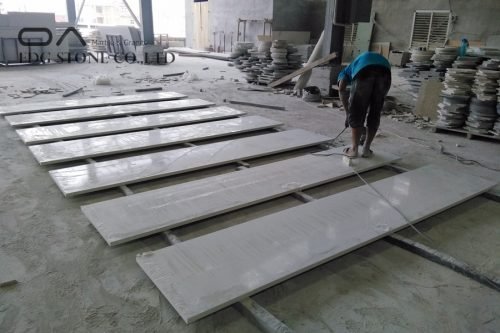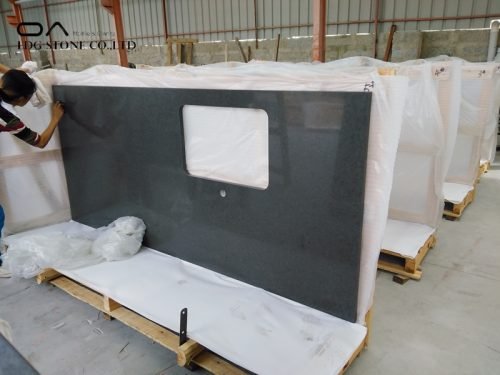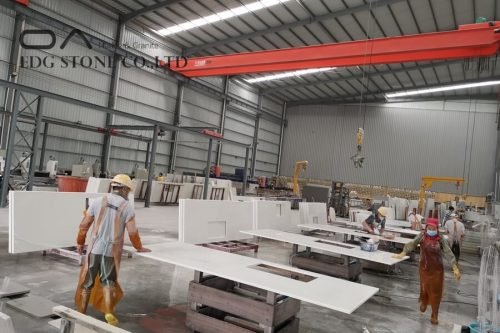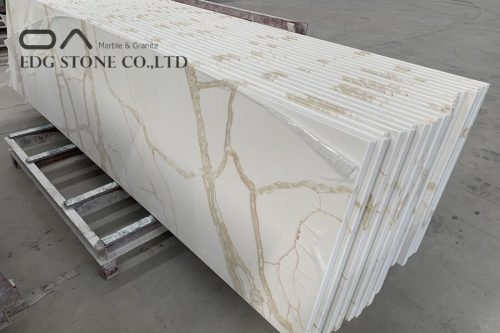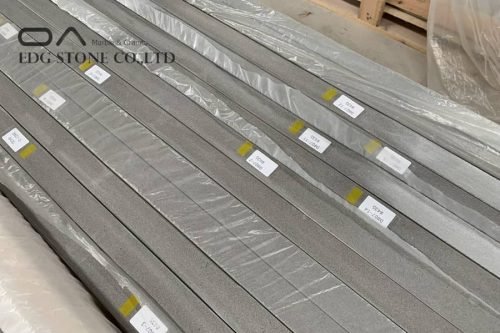
 The Ikea quartz countertops price cheaply made of engineered quartz (not to be confused with Quartzite, another appealing natural stone used as counters) is a manmade product created mostly from natural materials. It’s made of 90% to 94% ground quartz and 6% to 10% resins and pigments that are combined into durable and nonporous slabs. The strength of quartz, even in a manufactured form, makes it naturally resistant to abrasion, scratches, dents, and even acids without the need for sealants. And the environmental impact of manufactured quartz is low: Quartz is an abundant material and the finished product is nontoxic and nonallergenic and will last a lifetime, reducing the need for replacement.
The Ikea quartz countertops price cheaply made of engineered quartz (not to be confused with Quartzite, another appealing natural stone used as counters) is a manmade product created mostly from natural materials. It’s made of 90% to 94% ground quartz and 6% to 10% resins and pigments that are combined into durable and nonporous slabs. The strength of quartz, even in a manufactured form, makes it naturally resistant to abrasion, scratches, dents, and even acids without the need for sealants. And the environmental impact of manufactured quartz is low: Quartz is an abundant material and the finished product is nontoxic and nonallergenic and will last a lifetime, reducing the need for replacement.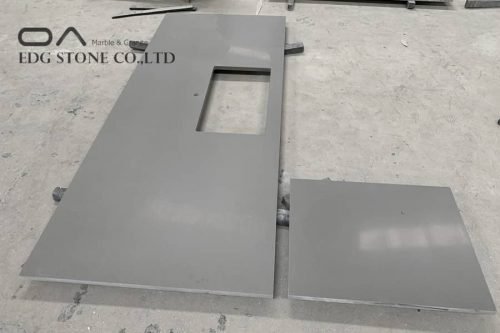
 The zodiaq quartz countertops made of engineered quartz (not to be confused with Quartzite, another appealing natural stone used as counters) is a manmade product created mostly from natural materials. It’s made of 90% to 94% ground quartz and 6% to 10% resins and pigments that are combined into durable and nonporous slabs. The strength of quartz, even in a manufactured form, makes it naturally resistant to abrasion, scratches, dents, and even acids without the need for sealants. And the environmental impact of manufactured quartz is low: Quartz is an abundant material and the finished product is nontoxic and nonallergenic and will last a lifetime, reducing the need for replacement.
The zodiaq quartz countertops made of engineered quartz (not to be confused with Quartzite, another appealing natural stone used as counters) is a manmade product created mostly from natural materials. It’s made of 90% to 94% ground quartz and 6% to 10% resins and pigments that are combined into durable and nonporous slabs. The strength of quartz, even in a manufactured form, makes it naturally resistant to abrasion, scratches, dents, and even acids without the need for sealants. And the environmental impact of manufactured quartz is low: Quartz is an abundant material and the finished product is nontoxic and nonallergenic and will last a lifetime, reducing the need for replacement.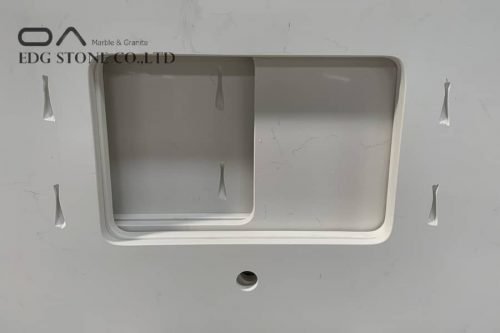
 The quartz countertop polishing compound made of engineered quartz (not to be confused with Quartzite, another appealing natural stone used as counters) is a manmade product created mostly from natural materials. It’s made of 90% to 94% ground quartz and 6% to 10% resins and pigments that are combined into durable and nonporous slabs. The strength of quartz, even in a manufactured form, makes it naturally resistant to abrasion, scratches, dents, and even acids without the need for sealants. And the environmental impact of manufactured quartz is low: Quartz is an abundant material and the finished product is nontoxic and nonallergenic and will last a lifetime, reducing the need for replacement.
The quartz countertop polishing compound made of engineered quartz (not to be confused with Quartzite, another appealing natural stone used as counters) is a manmade product created mostly from natural materials. It’s made of 90% to 94% ground quartz and 6% to 10% resins and pigments that are combined into durable and nonporous slabs. The strength of quartz, even in a manufactured form, makes it naturally resistant to abrasion, scratches, dents, and even acids without the need for sealants. And the environmental impact of manufactured quartz is low: Quartz is an abundant material and the finished product is nontoxic and nonallergenic and will last a lifetime, reducing the need for replacement.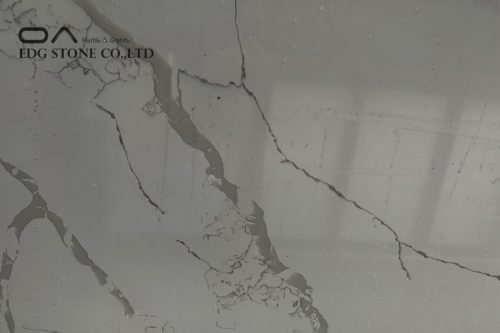
 The hanstone quartz countertops made of engineered quartz (not to be confused with Quartzite, another appealing natural stone used as counters) is a manmade product created mostly from natural materials. It’s made of 90% to 94% ground quartz and 6% to 10% resins and pigments that are combined into durable and nonporous slabs. The strength of quartz, even in a manufactured form, makes it naturally resistant to abrasion, scratches, dents, and even acids without the need for sealants. And the environmental impact of manufactured quartz is low: Quartz is an abundant material and the finished product is nontoxic and nonallergenic and will last a lifetime, reducing the need for replacement.
The hanstone quartz countertops made of engineered quartz (not to be confused with Quartzite, another appealing natural stone used as counters) is a manmade product created mostly from natural materials. It’s made of 90% to 94% ground quartz and 6% to 10% resins and pigments that are combined into durable and nonporous slabs. The strength of quartz, even in a manufactured form, makes it naturally resistant to abrasion, scratches, dents, and even acids without the need for sealants. And the environmental impact of manufactured quartz is low: Quartz is an abundant material and the finished product is nontoxic and nonallergenic and will last a lifetime, reducing the need for replacement.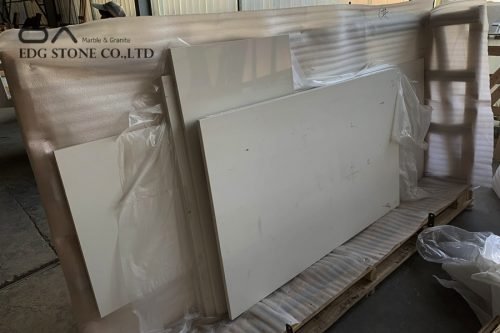
 The iced white quartz countertops made of engineered quartz (not to be confused with Quartzite, another appealing natural stone used as counters) is a manmade product created mostly from natural materials. It’s made of 90% to 94% ground quartz and 6% to 10% resins and pigments that are combined into durable and nonporous slabs. The strength of quartz, even in a manufactured form, makes it naturally resistant to abrasion, scratches, dents, and even acids without the need for sealants. And the environmental impact of manufactured quartz is low: Quartz is an abundant material and the finished product is nontoxic and nonallergenic and will last a lifetime, reducing the need for replacement.
The iced white quartz countertops made of engineered quartz (not to be confused with Quartzite, another appealing natural stone used as counters) is a manmade product created mostly from natural materials. It’s made of 90% to 94% ground quartz and 6% to 10% resins and pigments that are combined into durable and nonporous slabs. The strength of quartz, even in a manufactured form, makes it naturally resistant to abrasion, scratches, dents, and even acids without the need for sealants. And the environmental impact of manufactured quartz is low: Quartz is an abundant material and the finished product is nontoxic and nonallergenic and will last a lifetime, reducing the need for replacement.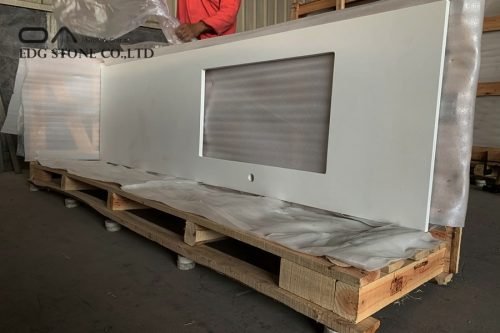
 The rococo quartz countertop made of engineered quartz (not to be confused with Quartzite, another appealing natural stone used as counters) is a manmade product created mostly from natural materials. It’s made of 90% to 94% ground quartz and 6% to 10% resins and pigments that are combined into durable and nonporous slabs. The strength of quartz, even in a manufactured form, makes it naturally resistant to abrasion, scratches, dents, and even acids without the need for sealants. And the environmental impact of manufactured quartz is low: Quartz is an abundant material and the finished product is nontoxic and nonallergenic and will last a lifetime, reducing the need for replacement.
The rococo quartz countertop made of engineered quartz (not to be confused with Quartzite, another appealing natural stone used as counters) is a manmade product created mostly from natural materials. It’s made of 90% to 94% ground quartz and 6% to 10% resins and pigments that are combined into durable and nonporous slabs. The strength of quartz, even in a manufactured form, makes it naturally resistant to abrasion, scratches, dents, and even acids without the need for sealants. And the environmental impact of manufactured quartz is low: Quartz is an abundant material and the finished product is nontoxic and nonallergenic and will last a lifetime, reducing the need for replacement.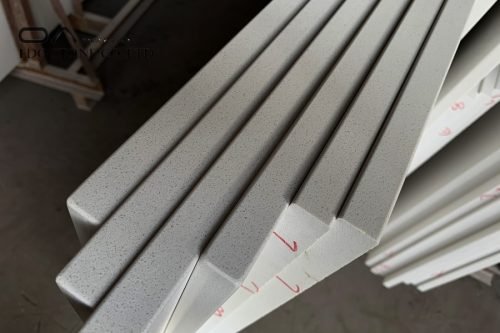
 The 2 cm quartz countertop made of engineered quartz (not to be confused with Quartzite, another appealing natural stone used as counters) is a manmade product created mostly from natural materials. It’s made of 90% to 94% ground quartz and 6% to 10% resins and pigments that are combined into durable and nonporous slabs. The strength of quartz, even in a manufactured form, makes it naturally resistant to abrasion, scratches, dents, and even acids without the need for sealants. And the environmental impact of manufactured quartz is low: Quartz is an abundant material and the finished product is nontoxic and nonallergenic and will last a lifetime, reducing the need for replacement.
The 2 cm quartz countertop made of engineered quartz (not to be confused with Quartzite, another appealing natural stone used as counters) is a manmade product created mostly from natural materials. It’s made of 90% to 94% ground quartz and 6% to 10% resins and pigments that are combined into durable and nonporous slabs. The strength of quartz, even in a manufactured form, makes it naturally resistant to abrasion, scratches, dents, and even acids without the need for sealants. And the environmental impact of manufactured quartz is low: Quartz is an abundant material and the finished product is nontoxic and nonallergenic and will last a lifetime, reducing the need for replacement.
 The quartz island countertop made of engineered quartz (not to be confused with Quartzite, another appealing natural stone used as counters) is a manmade product created mostly from natural materials. It’s made of 90% to 94% ground quartz and 6% to 10% resins and pigments that are combined into durable and nonporous slabs. The strength of quartz, even in a manufactured form, makes it naturally resistant to abrasion, scratches, dents, and even acids without the need for sealants. And the environmental impact of manufactured quartz is low: Quartz is an abundant material and the finished product is nontoxic and nonallergenic and will last a lifetime, reducing the need for replacement.
The quartz island countertop made of engineered quartz (not to be confused with Quartzite, another appealing natural stone used as counters) is a manmade product created mostly from natural materials. It’s made of 90% to 94% ground quartz and 6% to 10% resins and pigments that are combined into durable and nonporous slabs. The strength of quartz, even in a manufactured form, makes it naturally resistant to abrasion, scratches, dents, and even acids without the need for sealants. And the environmental impact of manufactured quartz is low: Quartz is an abundant material and the finished product is nontoxic and nonallergenic and will last a lifetime, reducing the need for replacement.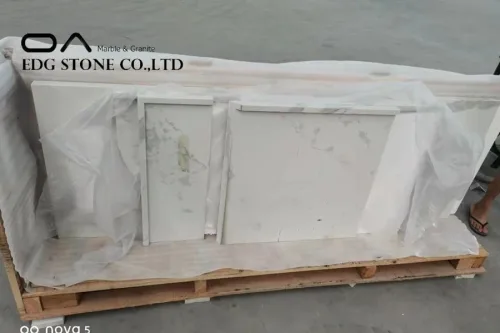
 The tan quartz countertops made of engineered quartz (not to be confused with Quartzite, another appealing natural stone used as counters) is a manmade product created mostly from natural materials. It’s made of 90% to 94% ground quartz and 6% to 10% resins and pigments that are combined into durable and nonporous slabs. The strength of quartz, even in a manufactured form, makes it naturally resistant to abrasion, scratches, dents, and even acids without the need for sealants. And the environmental impact of manufactured quartz is low: Quartz is an abundant material and the finished product is nontoxic and nonallergenic and will last a lifetime, reducing the need for replacement.
The tan quartz countertops made of engineered quartz (not to be confused with Quartzite, another appealing natural stone used as counters) is a manmade product created mostly from natural materials. It’s made of 90% to 94% ground quartz and 6% to 10% resins and pigments that are combined into durable and nonporous slabs. The strength of quartz, even in a manufactured form, makes it naturally resistant to abrasion, scratches, dents, and even acids without the need for sealants. And the environmental impact of manufactured quartz is low: Quartz is an abundant material and the finished product is nontoxic and nonallergenic and will last a lifetime, reducing the need for replacement.
 The manufactured quartz countertops made of engineered quartz (not to be confused with Quartzite, another appealing natural stone used as counters) is a manmade product created mostly from natural materials. It’s made of 90% to 94% ground quartz and 6% to 10% resins and pigments that are combined into durable and nonporous slabs. The strength of quartz, even in a manufactured form, makes it naturally resistant to abrasion, scratches, dents, and even acids without the need for sealants. And the environmental impact of manufactured quartz is low: Quartz is an abundant material and the finished product is nontoxic and nonallergenic and will last a lifetime, reducing the need for replacement.
The manufactured quartz countertops made of engineered quartz (not to be confused with Quartzite, another appealing natural stone used as counters) is a manmade product created mostly from natural materials. It’s made of 90% to 94% ground quartz and 6% to 10% resins and pigments that are combined into durable and nonporous slabs. The strength of quartz, even in a manufactured form, makes it naturally resistant to abrasion, scratches, dents, and even acids without the need for sealants. And the environmental impact of manufactured quartz is low: Quartz is an abundant material and the finished product is nontoxic and nonallergenic and will last a lifetime, reducing the need for replacement.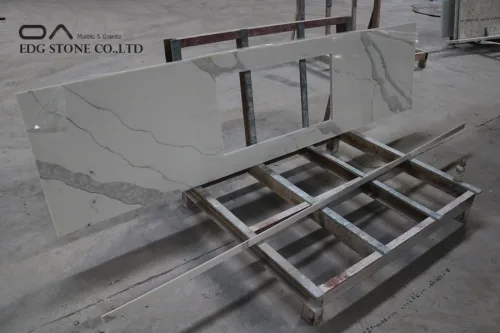
 The chipped quartz countertop made of engineered quartz (not to be confused with Quartzite, another appealing natural stone used as counters) is a manmade product created mostly from natural materials. It’s made of 90% to 94% ground quartz and 6% to 10% resins and pigments that are combined into durable and nonporous slabs. The strength of quartz, even in a manufactured form, makes it naturally resistant to abrasion, scratches, dents, and even acids without the need for sealants. And the environmental impact of manufactured quartz is low: Quartz is an abundant material and the finished product is nontoxic and nonallergenic and will last a lifetime, reducing the need for replacement.
The chipped quartz countertop made of engineered quartz (not to be confused with Quartzite, another appealing natural stone used as counters) is a manmade product created mostly from natural materials. It’s made of 90% to 94% ground quartz and 6% to 10% resins and pigments that are combined into durable and nonporous slabs. The strength of quartz, even in a manufactured form, makes it naturally resistant to abrasion, scratches, dents, and even acids without the need for sealants. And the environmental impact of manufactured quartz is low: Quartz is an abundant material and the finished product is nontoxic and nonallergenic and will last a lifetime, reducing the need for replacement.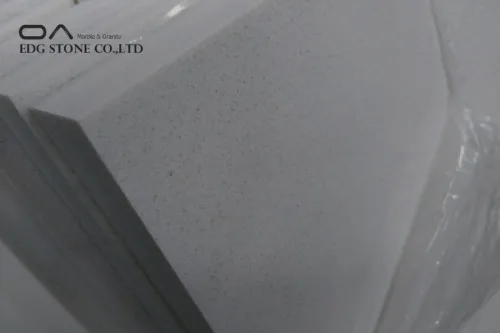
 The everest quartz countertop made of engineered quartz (not to be confused with Quartzite, another appealing natural stone used as counters) is a manmade product created mostly from natural materials. It’s made of 90% to 94% ground quartz and 6% to 10% resins and pigments that are combined into durable and nonporous slabs. The strength of quartz, even in a manufactured form, makes it naturally resistant to abrasion, scratches, dents, and even acids without the need for sealants. And the environmental impact of manufactured quartz is low: Quartz is an abundant material and the finished product is nontoxic and nonallergenic and will last a lifetime, reducing the need for replacement.
The everest quartz countertop made of engineered quartz (not to be confused with Quartzite, another appealing natural stone used as counters) is a manmade product created mostly from natural materials. It’s made of 90% to 94% ground quartz and 6% to 10% resins and pigments that are combined into durable and nonporous slabs. The strength of quartz, even in a manufactured form, makes it naturally resistant to abrasion, scratches, dents, and even acids without the need for sealants. And the environmental impact of manufactured quartz is low: Quartz is an abundant material and the finished product is nontoxic and nonallergenic and will last a lifetime, reducing the need for replacement.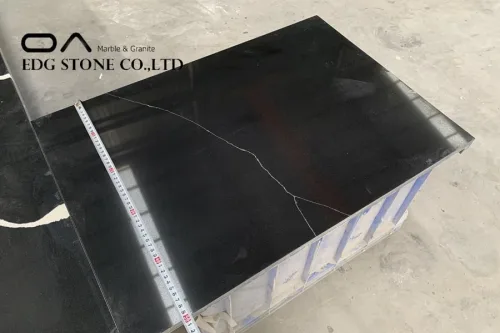
 The black and white quartz countertops made of engineered quartz (not to be confused with Quartzite, another appealing natural stone used as counters) is a manmade product created mostly from natural materials. It’s made of 90% to 94% ground quartz and 6% to 10% resins and pigments that are combined into durable and nonporous slabs. The strength of quartz, even in a manufactured form, makes it naturally resistant to abrasion, scratches, dents, and even acids without the need for sealants. And the environmental impact of manufactured quartz is low: Quartz is an abundant material and the finished product is nontoxic and nonallergenic and will last a lifetime, reducing the need for replacement.
The black and white quartz countertops made of engineered quartz (not to be confused with Quartzite, another appealing natural stone used as counters) is a manmade product created mostly from natural materials. It’s made of 90% to 94% ground quartz and 6% to 10% resins and pigments that are combined into durable and nonporous slabs. The strength of quartz, even in a manufactured form, makes it naturally resistant to abrasion, scratches, dents, and even acids without the need for sealants. And the environmental impact of manufactured quartz is low: Quartz is an abundant material and the finished product is nontoxic and nonallergenic and will last a lifetime, reducing the need for replacement.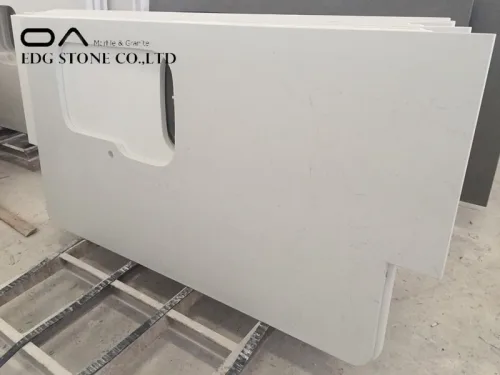
 The minuet quartz countertop made of engineered quartz (not to be confused with Quartzite, another appealing natural stone used as counters) is a manmade product created mostly from natural materials. It’s made of 90% to 94% ground quartz and 6% to 10% resins and pigments that are combined into durable and nonporous slabs. The strength of quartz, even in a manufactured form, makes it naturally resistant to abrasion, scratches, dents, and even acids without the need for sealants. And the environmental impact of manufactured quartz is low: Quartz is an abundant material and the finished product is nontoxic and nonallergenic and will last a lifetime, reducing the need for replacement.
The minuet quartz countertop made of engineered quartz (not to be confused with Quartzite, another appealing natural stone used as counters) is a manmade product created mostly from natural materials. It’s made of 90% to 94% ground quartz and 6% to 10% resins and pigments that are combined into durable and nonporous slabs. The strength of quartz, even in a manufactured form, makes it naturally resistant to abrasion, scratches, dents, and even acids without the need for sealants. And the environmental impact of manufactured quartz is low: Quartz is an abundant material and the finished product is nontoxic and nonallergenic and will last a lifetime, reducing the need for replacement.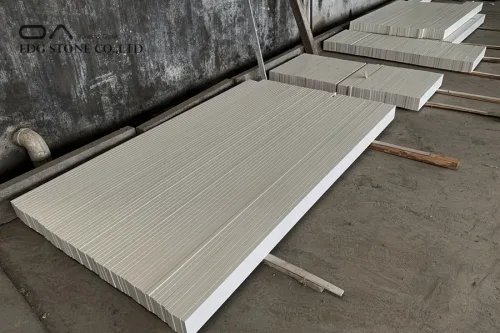
 The aria quartz countertops made of engineered quartz (not to be confused with Quartzite, another appealing natural stone used as counters) is a manmade product created mostly from natural materials. It’s made of 90% to 94% ground quartz and 6% to 10% resins and pigments that are combined into durable and nonporous slabs. The strength of quartz, even in a manufactured form, makes it naturally resistant to abrasion, scratches, dents, and even acids without the need for sealants. And the environmental impact of manufactured quartz is low: Quartz is an abundant material and the finished product is nontoxic and nonallergenic and will last a lifetime, reducing the need for replacement.
The aria quartz countertops made of engineered quartz (not to be confused with Quartzite, another appealing natural stone used as counters) is a manmade product created mostly from natural materials. It’s made of 90% to 94% ground quartz and 6% to 10% resins and pigments that are combined into durable and nonporous slabs. The strength of quartz, even in a manufactured form, makes it naturally resistant to abrasion, scratches, dents, and even acids without the need for sealants. And the environmental impact of manufactured quartz is low: Quartz is an abundant material and the finished product is nontoxic and nonallergenic and will last a lifetime, reducing the need for replacement.
 The quartz waterfall countertop made of engineered quartz (not to be confused with Quartzite, another appealing natural stone used as counters) is a manmade product created mostly from natural materials. It’s made of 90% to 94% ground quartz and 6% to 10% resins and pigments that are combined into durable and nonporous slabs. The strength of quartz, even in a manufactured form, makes it naturally resistant to abrasion, scratches, dents, and even acids without the need for sealants. And the environmental impact of manufactured quartz is low: Quartz is an abundant material and the finished product is nontoxic and nonallergenic and will last a lifetime, reducing the need for replacement.
The quartz waterfall countertop made of engineered quartz (not to be confused with Quartzite, another appealing natural stone used as counters) is a manmade product created mostly from natural materials. It’s made of 90% to 94% ground quartz and 6% to 10% resins and pigments that are combined into durable and nonporous slabs. The strength of quartz, even in a manufactured form, makes it naturally resistant to abrasion, scratches, dents, and even acids without the need for sealants. And the environmental impact of manufactured quartz is low: Quartz is an abundant material and the finished product is nontoxic and nonallergenic and will last a lifetime, reducing the need for replacement.
 recycled quartz countertops made of engineered quartz (not to be confused with Quartzite, another appealing natural stone used as counters) is a manmade product created mostly from natural materials. It’s made of 90% to 94% ground quartz and 6% to 10% resins and pigments that are combined into durable and nonporous slabs. The strength of quartz, even in a manufactured form, makes it naturally resistant to abrasion, scratches, dents, and even acids without the need for sealants. And the environmental impact of manufactured quartz is low: Quartz is an abundant material and the finished product is nontoxic and nonallergenic and will last a lifetime, reducing the need for replacement.
recycled quartz countertops made of engineered quartz (not to be confused with Quartzite, another appealing natural stone used as counters) is a manmade product created mostly from natural materials. It’s made of 90% to 94% ground quartz and 6% to 10% resins and pigments that are combined into durable and nonporous slabs. The strength of quartz, even in a manufactured form, makes it naturally resistant to abrasion, scratches, dents, and even acids without the need for sealants. And the environmental impact of manufactured quartz is low: Quartz is an abundant material and the finished product is nontoxic and nonallergenic and will last a lifetime, reducing the need for replacement.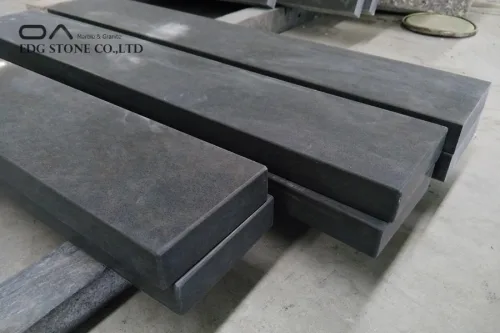
 The grey quartz countertops white cabinets made of engineered quartz (not to be confused with Quartzite, another appealing natural stone used as counters) is a manmade product created mostly from natural materials. It’s made of 90% to 94% ground quartz and 6% to 10% resins and pigments that are combined into durable and nonporous slabs. The strength of quartz, even in a manufactured form, makes it naturally resistant to abrasion, scratches, dents, and even acids without the need for sealants. And the environmental impact of manufactured quartz is low: Quartz is an abundant material and the finished product is nontoxic and nonallergenic and will last a lifetime, reducing the need for replacement.
The grey quartz countertops white cabinets made of engineered quartz (not to be confused with Quartzite, another appealing natural stone used as counters) is a manmade product created mostly from natural materials. It’s made of 90% to 94% ground quartz and 6% to 10% resins and pigments that are combined into durable and nonporous slabs. The strength of quartz, even in a manufactured form, makes it naturally resistant to abrasion, scratches, dents, and even acids without the need for sealants. And the environmental impact of manufactured quartz is low: Quartz is an abundant material and the finished product is nontoxic and nonallergenic and will last a lifetime, reducing the need for replacement. The pure white quartz countertops made of engineered quartz (not to be confused with Quartzite, another appealing natural stone used as counters) is a manmade product created mostly from natural materials. It’s made of 90% to 94% ground quartz and 6% to 10% resins and pigments that are combined into durable and nonporous slabs. The strength of quartz, even in a manufactured form, makes it naturally resistant to abrasion, scratches, dents, and even acids without the need for sealants. And the environmental impact of manufactured quartz is low: Quartz is an abundant material and the finished product is nontoxic and nonallergenic and will last a lifetime, reducing the need for replacement.
The pure white quartz countertops made of engineered quartz (not to be confused with Quartzite, another appealing natural stone used as counters) is a manmade product created mostly from natural materials. It’s made of 90% to 94% ground quartz and 6% to 10% resins and pigments that are combined into durable and nonporous slabs. The strength of quartz, even in a manufactured form, makes it naturally resistant to abrasion, scratches, dents, and even acids without the need for sealants. And the environmental impact of manufactured quartz is low: Quartz is an abundant material and the finished product is nontoxic and nonallergenic and will last a lifetime, reducing the need for replacement. The white quartz bathroom countertops made of engineered quartz (not to be confused with Quartzite, another appealing natural stone used as counters) is a manmade product created mostly from natural materials. It’s made of 90% to 94% ground quartz and 6% to 10% resins and pigments that are combined into durable and nonporous slabs. The strength of quartz, even in a manufactured form, makes it naturally resistant to abrasion, scratches, dents, and even acids without the need for sealants. And the environmental impact of manufactured quartz is low: Quartz is an abundant material and the finished product is nontoxic and nonallergenic and will last a lifetime, reducing the need for replacement.
The white quartz bathroom countertops made of engineered quartz (not to be confused with Quartzite, another appealing natural stone used as counters) is a manmade product created mostly from natural materials. It’s made of 90% to 94% ground quartz and 6% to 10% resins and pigments that are combined into durable and nonporous slabs. The strength of quartz, even in a manufactured form, makes it naturally resistant to abrasion, scratches, dents, and even acids without the need for sealants. And the environmental impact of manufactured quartz is low: Quartz is an abundant material and the finished product is nontoxic and nonallergenic and will last a lifetime, reducing the need for replacement. The rose quartz countertop made of engineered quartz (not to be confused with Quartzite, another appealing natural stone used as counters) is a manmade product created mostly from natural materials. It’s made of 90% to 94% ground quartz and 6% to 10% resins and pigments that are combined into durable and nonporous slabs. The strength of quartz, even in a manufactured form, makes it naturally resistant to abrasion, scratches, dents, and even acids without the need for sealants. And the environmental impact of manufactured quartz is low: Quartz is an abundant material and the finished product is nontoxic and nonallergenic and will last a lifetime, reducing the need for replacement.
The rose quartz countertop made of engineered quartz (not to be confused with Quartzite, another appealing natural stone used as counters) is a manmade product created mostly from natural materials. It’s made of 90% to 94% ground quartz and 6% to 10% resins and pigments that are combined into durable and nonporous slabs. The strength of quartz, even in a manufactured form, makes it naturally resistant to abrasion, scratches, dents, and even acids without the need for sealants. And the environmental impact of manufactured quartz is low: Quartz is an abundant material and the finished product is nontoxic and nonallergenic and will last a lifetime, reducing the need for replacement. The rose quartz countertop prices made of engineered quartz (not to be confused with Quartzite, another appealing natural stone used as counters) is a manmade product created mostly from natural materials. It’s made of 90% to 94% ground quartz and 6% to 10% resins and pigments that are combined into durable and nonporous slabs. The strength of quartz, even in a manufactured form, makes it naturally resistant to abrasion, scratches, dents, and even acids without the need for sealants. And the environmental impact of manufactured quartz is low: Quartz is an abundant material and the finished product is nontoxic and nonallergenic and will last a lifetime, reducing the need for replacement.
The rose quartz countertop prices made of engineered quartz (not to be confused with Quartzite, another appealing natural stone used as counters) is a manmade product created mostly from natural materials. It’s made of 90% to 94% ground quartz and 6% to 10% resins and pigments that are combined into durable and nonporous slabs. The strength of quartz, even in a manufactured form, makes it naturally resistant to abrasion, scratches, dents, and even acids without the need for sealants. And the environmental impact of manufactured quartz is low: Quartz is an abundant material and the finished product is nontoxic and nonallergenic and will last a lifetime, reducing the need for replacement. The white and grey quartz countertops made of engineered quartz (not to be confused with Quartzite, another appealing natural stone used as counters) is a manmade product created mostly from natural materials. It’s made of 90% to 94% ground quartz and 6% to 10% resins and pigments that are combined into durable and nonporous slabs. The strength of quartz, even in a manufactured form, makes it naturally resistant to abrasion, scratches, dents, and even acids without the need for sealants. And the environmental impact of manufactured quartz is low: Quartz is an abundant material and the finished product is nontoxic and nonallergenic and will last a lifetime, reducing the need for replacement.
The white and grey quartz countertops made of engineered quartz (not to be confused with Quartzite, another appealing natural stone used as counters) is a manmade product created mostly from natural materials. It’s made of 90% to 94% ground quartz and 6% to 10% resins and pigments that are combined into durable and nonporous slabs. The strength of quartz, even in a manufactured form, makes it naturally resistant to abrasion, scratches, dents, and even acids without the need for sealants. And the environmental impact of manufactured quartz is low: Quartz is an abundant material and the finished product is nontoxic and nonallergenic and will last a lifetime, reducing the need for replacement. The matte black quartz countertops made of engineered quartz (not to be confused with Quartzite, another appealing natural stone used as counters) is a manmade product created mostly from natural materials. It’s made of 90% to 94% ground quartz and 6% to 10% resins and pigments that are combined into durable and nonporous slabs. The strength of quartz, even in a manufactured form, makes it naturally resistant to abrasion, scratches, dents, and even acids without the need for sealants. And the environmental impact of manufactured quartz is low: Quartz is an abundant material and the finished product is nontoxic and nonallergenic and will last a lifetime, reducing the need for replacement.
The matte black quartz countertops made of engineered quartz (not to be confused with Quartzite, another appealing natural stone used as counters) is a manmade product created mostly from natural materials. It’s made of 90% to 94% ground quartz and 6% to 10% resins and pigments that are combined into durable and nonporous slabs. The strength of quartz, even in a manufactured form, makes it naturally resistant to abrasion, scratches, dents, and even acids without the need for sealants. And the environmental impact of manufactured quartz is low: Quartz is an abundant material and the finished product is nontoxic and nonallergenic and will last a lifetime, reducing the need for replacement. The Surface matte quartz countertops made of engineered quartz (not to be confused with Quartzite, another appealing natural stone used as counters) is a manmade product created mostly from natural materials. It’s made of 90% to 94% ground quartz and 6% to 10% resins and pigments that are combined into durable and nonporous slabs. The strength of quartz, even in a manufactured form, makes it naturally resistant to abrasion, scratches, dents, and even acids without the need for sealants. And the environmental impact of manufactured quartz is low: Quartz is an abundant material and the finished product is nontoxic and nonallergenic and will last a lifetime, reducing the need for replacement.
The Surface matte quartz countertops made of engineered quartz (not to be confused with Quartzite, another appealing natural stone used as counters) is a manmade product created mostly from natural materials. It’s made of 90% to 94% ground quartz and 6% to 10% resins and pigments that are combined into durable and nonporous slabs. The strength of quartz, even in a manufactured form, makes it naturally resistant to abrasion, scratches, dents, and even acids without the need for sealants. And the environmental impact of manufactured quartz is low: Quartz is an abundant material and the finished product is nontoxic and nonallergenic and will last a lifetime, reducing the need for replacement. The white sparkle quartz countertops made of engineered quartz (not to be confused with Quartzite, another appealing natural stone used as counters) is a manmade product created mostly from natural materials. It’s made of 90% to 94% ground quartz and 6% to 10% resins and pigments that are combined into durable and nonporous slabs. The strength of quartz, even in a manufactured form, makes it naturally resistant to abrasion, scratches, dents, and even acids without the need for sealants. And the environmental impact of manufactured quartz is low: Quartz is an abundant material and the finished product is nontoxic and nonallergenic and will last a lifetime, reducing the need for replacement.
The white sparkle quartz countertops made of engineered quartz (not to be confused with Quartzite, another appealing natural stone used as counters) is a manmade product created mostly from natural materials. It’s made of 90% to 94% ground quartz and 6% to 10% resins and pigments that are combined into durable and nonporous slabs. The strength of quartz, even in a manufactured form, makes it naturally resistant to abrasion, scratches, dents, and even acids without the need for sealants. And the environmental impact of manufactured quartz is low: Quartz is an abundant material and the finished product is nontoxic and nonallergenic and will last a lifetime, reducing the need for replacement. The sealing quartz countertops made of engineered quartz (not to be confused with Quartzite, another appealing natural stone used as counters) is a manmade product created mostly from natural materials. It’s made of 90% to 94% ground quartz and 6% to 10% resins and pigments that are combined into durable and nonporous slabs. The strength of quartz, even in a manufactured form, makes it naturally resistant to abrasion, scratches, dents, and even acids without the need for sealants. And the environmental impact of manufactured quartz is low: Quartz is an abundant material and the finished product is nontoxic and nonallergenic and will last a lifetime, reducing the need for replacement.
The sealing quartz countertops made of engineered quartz (not to be confused with Quartzite, another appealing natural stone used as counters) is a manmade product created mostly from natural materials. It’s made of 90% to 94% ground quartz and 6% to 10% resins and pigments that are combined into durable and nonporous slabs. The strength of quartz, even in a manufactured form, makes it naturally resistant to abrasion, scratches, dents, and even acids without the need for sealants. And the environmental impact of manufactured quartz is low: Quartz is an abundant material and the finished product is nontoxic and nonallergenic and will last a lifetime, reducing the need for replacement. The OEM LG quartz countertops made of engineered quartz (not to be confused with Quartzite, another appealing natural stone used as counters) is a manmade product created mostly from natural materials. It’s made of 90% to 94% ground quartz and 6% to 10% resins and pigments that are combined into durable and nonporous slabs. The strength of quartz, even in a manufactured form, makes it naturally resistant to abrasion, scratches, dents, and even acids without the need for sealants. And the environmental impact of manufactured quartz is low: Quartz is an abundant material and the finished product is nontoxic and nonallergenic and will last a lifetime, reducing the need for replacement.
The OEM LG quartz countertops made of engineered quartz (not to be confused with Quartzite, another appealing natural stone used as counters) is a manmade product created mostly from natural materials. It’s made of 90% to 94% ground quartz and 6% to 10% resins and pigments that are combined into durable and nonporous slabs. The strength of quartz, even in a manufactured form, makes it naturally resistant to abrasion, scratches, dents, and even acids without the need for sealants. And the environmental impact of manufactured quartz is low: Quartz is an abundant material and the finished product is nontoxic and nonallergenic and will last a lifetime, reducing the need for replacement.
 The quartz countertops with oak cabinets made of engineered quartz (not to be confused with Quartzite, another appealing natural stone used as counters) is a manmade product created mostly from natural materials. It’s made of 90% to 94% ground quartz and 6% to 10% resins and pigments that are combined into durable and nonporous slabs. The strength of quartz, even in a manufactured form, makes it naturally resistant to abrasion, scratches, dents, and even acids without the need for sealants. And the environmental impact of manufactured quartz is low: Quartz is an abundant material and the finished product is nontoxic and nonallergenic and will last a lifetime, reducing the need for replacement.
The quartz countertops with oak cabinets made of engineered quartz (not to be confused with Quartzite, another appealing natural stone used as counters) is a manmade product created mostly from natural materials. It’s made of 90% to 94% ground quartz and 6% to 10% resins and pigments that are combined into durable and nonporous slabs. The strength of quartz, even in a manufactured form, makes it naturally resistant to abrasion, scratches, dents, and even acids without the need for sealants. And the environmental impact of manufactured quartz is low: Quartz is an abundant material and the finished product is nontoxic and nonallergenic and will last a lifetime, reducing the need for replacement.
 The white and gray quartz countertops made of engineered quartz (not to be confused with Quartzite, another appealing natural stone used as counters) is a manmade product created mostly from natural materials. It’s made of 90% to 94% ground quartz and 6% to 10% resins and pigments that are combined into durable and nonporous slabs. The strength of quartz, even in a manufactured form, makes it naturally resistant to abrasion, scratches, dents, and even acids without the need for sealants. And the environmental impact of manufactured quartz is low: Quartz is an abundant material and the finished product is nontoxic and nonallergenic and will last a lifetime, reducing the need for replacement.
The white and gray quartz countertops made of engineered quartz (not to be confused with Quartzite, another appealing natural stone used as counters) is a manmade product created mostly from natural materials. It’s made of 90% to 94% ground quartz and 6% to 10% resins and pigments that are combined into durable and nonporous slabs. The strength of quartz, even in a manufactured form, makes it naturally resistant to abrasion, scratches, dents, and even acids without the need for sealants. And the environmental impact of manufactured quartz is low: Quartz is an abundant material and the finished product is nontoxic and nonallergenic and will last a lifetime, reducing the need for replacement.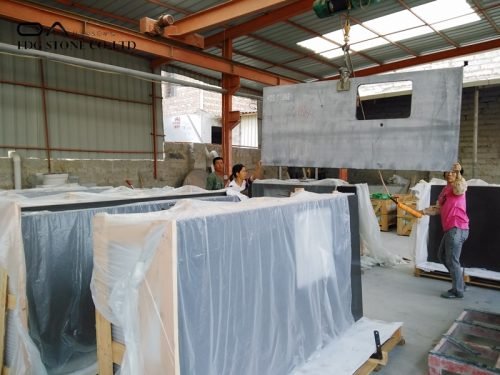
 The cherry cabinets with quartz countertops made of engineered quartz (not to be confused with Quartzite, another appealing natural stone used as counters) is a manmade product created mostly from natural materials. It’s made of 90% to 94% ground quartz and 6% to 10% resins and pigments that are combined into durable and nonporous slabs. The strength of quartz, even in a manufactured form, makes it naturally resistant to abrasion, scratches, dents, and even acids without the need for sealants. And the environmental impact of manufactured quartz is low: Quartz is an abundant material and the finished product is nontoxic and nonallergenic and will last a lifetime, reducing the need for replacement.
The cherry cabinets with quartz countertops made of engineered quartz (not to be confused with Quartzite, another appealing natural stone used as counters) is a manmade product created mostly from natural materials. It’s made of 90% to 94% ground quartz and 6% to 10% resins and pigments that are combined into durable and nonporous slabs. The strength of quartz, even in a manufactured form, makes it naturally resistant to abrasion, scratches, dents, and even acids without the need for sealants. And the environmental impact of manufactured quartz is low: Quartz is an abundant material and the finished product is nontoxic and nonallergenic and will last a lifetime, reducing the need for replacement.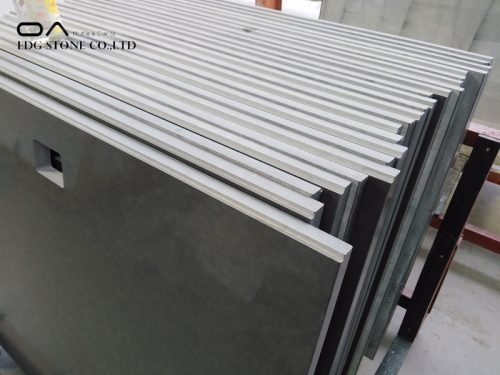
 The custom quartz countertop made of engineered quartz (not to be confused with Quartzite, another appealing natural stone used as counters) is a manmade product created mostly from natural materials. It’s made of 90% to 94% ground quartz and 6% to 10% resins and pigments that are combined into durable and nonporous slabs. The strength of quartz, even in a manufactured form, makes it naturally resistant to abrasion, scratches, dents, and even acids without the need for sealants. And the environmental impact of manufactured quartz is low: Quartz is an abundant material and the finished product is nontoxic and nonallergenic and will last a lifetime, reducing the need for replacement.
The custom quartz countertop made of engineered quartz (not to be confused with Quartzite, another appealing natural stone used as counters) is a manmade product created mostly from natural materials. It’s made of 90% to 94% ground quartz and 6% to 10% resins and pigments that are combined into durable and nonporous slabs. The strength of quartz, even in a manufactured form, makes it naturally resistant to abrasion, scratches, dents, and even acids without the need for sealants. And the environmental impact of manufactured quartz is low: Quartz is an abundant material and the finished product is nontoxic and nonallergenic and will last a lifetime, reducing the need for replacement.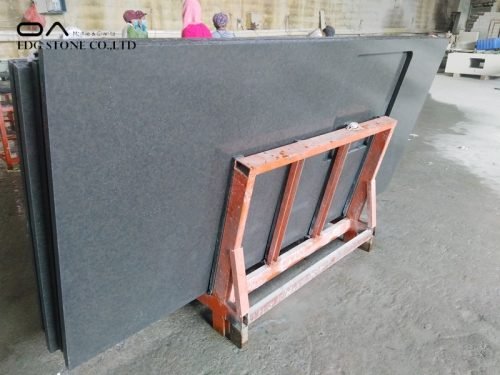
 The slate quartz countertop made of engineered quartz (not to be confused with Quartzite, another appealing natural stone used as counters) is a manmade product created mostly from natural materials. It’s made of 90% to 94% ground quartz and 6% to 10% resins and pigments that are combined into durable and nonporous slabs. The strength of quartz, even in a manufactured form, makes it naturally resistant to abrasion, scratches, dents, and even acids without the need for sealants. And the environmental impact of manufactured quartz is low: Quartz is an abundant material and the finished product is nontoxic and nonallergenic and will last a lifetime, reducing the need for replacement.
The slate quartz countertop made of engineered quartz (not to be confused with Quartzite, another appealing natural stone used as counters) is a manmade product created mostly from natural materials. It’s made of 90% to 94% ground quartz and 6% to 10% resins and pigments that are combined into durable and nonporous slabs. The strength of quartz, even in a manufactured form, makes it naturally resistant to abrasion, scratches, dents, and even acids without the need for sealants. And the environmental impact of manufactured quartz is low: Quartz is an abundant material and the finished product is nontoxic and nonallergenic and will last a lifetime, reducing the need for replacement. The kitchens with aria quartz countertops made of engineered quartz (not to be confused with Quartzite, another appealing natural stone used as counters) is a manmade product created mostly from natural materials. It’s made of 90% to 94% ground quartz and 6% to 10% resins and pigments that are combined into durable and nonporous slabs. The strength of quartz, even in a manufactured form, makes it naturally resistant to abrasion, scratches, dents, and even acids without the need for sealants. And the environmental impact of manufactured quartz is low: Quartz is an abundant material and the finished product is nontoxic and nonallergenic and will last a lifetime, reducing the need for replacement.
The kitchens with aria quartz countertops made of engineered quartz (not to be confused with Quartzite, another appealing natural stone used as counters) is a manmade product created mostly from natural materials. It’s made of 90% to 94% ground quartz and 6% to 10% resins and pigments that are combined into durable and nonporous slabs. The strength of quartz, even in a manufactured form, makes it naturally resistant to abrasion, scratches, dents, and even acids without the need for sealants. And the environmental impact of manufactured quartz is low: Quartz is an abundant material and the finished product is nontoxic and nonallergenic and will last a lifetime, reducing the need for replacement. The Calacatta classique quartz kitchen made of engineered quartz (not to be confused with Quartzite, another appealing natural stone used as counters) is a manmade product created mostly from natural materials. It’s made of 90% to 94% ground quartz and 6% to 10% resins and pigments that are combined into durable and nonporous slabs. The strength of quartz, even in a manufactured form, makes it naturally resistant to abrasion, scratches, dents, and even acids without the need for sealants. And the environmental impact of manufactured quartz is low: Quartz is an abundant material and the finished product is nontoxic and nonallergenic and will last a lifetime, reducing the need for replacement.
The Calacatta classique quartz kitchen made of engineered quartz (not to be confused with Quartzite, another appealing natural stone used as counters) is a manmade product created mostly from natural materials. It’s made of 90% to 94% ground quartz and 6% to 10% resins and pigments that are combined into durable and nonporous slabs. The strength of quartz, even in a manufactured form, makes it naturally resistant to abrasion, scratches, dents, and even acids without the need for sealants. And the environmental impact of manufactured quartz is low: Quartz is an abundant material and the finished product is nontoxic and nonallergenic and will last a lifetime, reducing the need for replacement. The gray quartz countertops kitchen made of engineered quartz (not to be confused with Quartzite, another appealing natural stone used as counters) is a manmade product created mostly from natural materials. It’s made of 90% to 94% ground quartz and 6% to 10% resins and pigments that are combined into durable and nonporous slabs. The strength of quartz, even in a manufactured form, makes it naturally resistant to abrasion, scratches, dents, and even acids without the need for sealants. And the environmental impact of manufactured quartz is low: Quartz is an abundant material and the finished product is nontoxic and nonallergenic and will last a lifetime, reducing the need for replacement.
The gray quartz countertops kitchen made of engineered quartz (not to be confused with Quartzite, another appealing natural stone used as counters) is a manmade product created mostly from natural materials. It’s made of 90% to 94% ground quartz and 6% to 10% resins and pigments that are combined into durable and nonporous slabs. The strength of quartz, even in a manufactured form, makes it naturally resistant to abrasion, scratches, dents, and even acids without the need for sealants. And the environmental impact of manufactured quartz is low: Quartz is an abundant material and the finished product is nontoxic and nonallergenic and will last a lifetime, reducing the need for replacement.


